Peter MALONE
Saturday, 18 September 2021 19:51
Hitting a New High
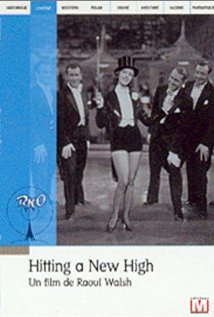
HITTING A NEW HIGH
US, 1957, 86 minutes, Black and white.
Lily Pons, Jack Oakie, John Howard, Edward Everett Horton, Eduardo Ciannelli, Eric Blore.
Directed by Raoul Walsh.
This film is a curiosity item. It was produced by RKO who hoped that opera singer, Lily Pons, would become a screen star – in the vein of Jeanette Mac Donald. It was not to be. While Lily Pons had a successful singing career, she did not have a charismatic personality screen and had a rather harsh speaking voice.
This film was directed by Raoul Walsh, who had been directing films since 1913 and was to continue into the 1960s, with a wide range of films, including tough thrillers at Warner Brothers as well as many Westerns.
Jack Oakie was a contemporary comedian and was to have a high point in his career with Charlie Chaplin, where they mocked Hitler and was Mussollini in The Great Dictator.
Popular comedian, Edward Everett Horton, usually in supporting roles is quite a prominent role in this one, using his usual mannerisms, the touch of dithering, and exposing pomposity. He is matched by comedian Eric Blore.
Nowadays the comedy of this film seems somewhat obvious and heavy-handed, a long opening with Horton wanting to be filmed with a lion – only to find that a live lion had been sent for the photoshoot . There is an expedition to Africa where Horton wants to bag a giraffe. Instead, with the connivance of Oakie, the opera singer poses as a jungle girl and is brought back to the United States with great publicity. She had been cabaret singer who wanted to enter opera, and this is an opportunity. Part of the tangles of the plot include her still having to sing in the New York club, attracting the attention of an entrepreneur played by Eduardo Ciannelli, and singing at a social occasion, exposing Horton and gaining a career.
There is a sub-plot remains where Lily Pons is in love with the orchestra conductor, John Howard, but has various clashes with him as regards career.
Not essential viewing, but a 1937 curiosity.
Published in Movie Reviews
Published in
Movie Reviews
Tagged under
Saturday, 18 September 2021 19:51
Empire State
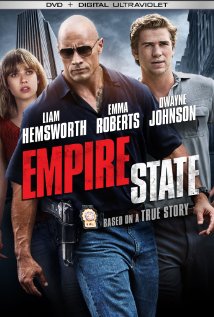
EMPIRE STATE
US, 2013, 96 minutes, Colour.
Liam Hemsworth, Michael Angarano, Dwayne Johnson, Paul Ben- Victor, Jerry Ferrara, Michael Rispoli, Emma Roberts, Nikki Reed, Chris Diamontopoulos.
Directed by Dito Montiel.
Empire State is a heist story, based on actual events in the 1980s, New York City.
The film has been directed by Dito Montiel, who came to some prominence with his film A Guide to Recognising Your Saints, followed by Fighting and The Son of No One. This film is rather more conventional, offering the background of the central antagonists, the build-up to the robbery, the police considering it as a strongly planned job, suspicious of the Mafia. However, it was scrappily organised and done by local small-time criminals.
Liam Hemsworth is a young man, refused training by the police because of a past misdemeanour, taking on a security job and finding security rather lax. When there is an attempt on the depot, and the authorities are unwilling to pay for compensation to the driver who was killed during the attack, Hemsworth decides to take some money and delivers it to the widow. He talks about it to his slacker friend, Michael Angarano, who then decides to rob the depot. After a false attempt, he goes on to the roof, falls through, gets the key, shoots the guard dog, takes the money and hits his friend on the head so that he will not be suspected.
Dwayne Johnson appears as the detective. Emma Roberts has a very small role as a girlfriend.
The final credits include an interview much later with the real Chris.
All in all, the film has some interest but is rather routine.
1. A heist story, a New York story? A true story? The images of the television coverage? The end and the real Chris appearing and being interviewed?
2. New York, the 1980s, style, clothes, cars, clubs, ethnic centres, homes, depots and vehicles? The movies of the time? The musical score? Authentic feel?
3. The opening, Detective Ransome and his interviews, going back three months?
4. The Greek family, the Greek clubs, Spiro and his associates, tough? Tommy and his work in the club, the toilet, being humiliated, Chris’s reaction? His being fired? The Greek tradition, the father, being honourable, not replying or retaliating? The mother, her strong stances, her friends, working in the garden, the gift of the statue? The parents and their bonds with Chris? His sister, her lack of clothes in the comments…?
5. Chris, wanting to join the police, his past, his record with Eddie, the request denied? His reaction? His anger on behalf of his father? Taking on the security job, $200 a week? Tony as his partner, a pleasant man, his family and children? The laxity of the depot, the money and the guard dog, easy access to the vault? Security cameras? Leaving the money out? The workers and their casual attitudes? The bosses? Chris and his work watching the security screens?
6. Tony, pleasant, his family, his being shot? The robbery attempt, Chris wearing his vest? The lack of recompense for Tony, Chris seeing the boss’s letter, stealing one of the bags and delivering it to Tony’s his wife?
7. Eddie, a motormouth, lacking intelligence, age, friendship with Chris, lazy, wanting money, his loose talk, his past with Chris and the record? Contact with the Greeks? With the Colombian drug dealers? His ambitions, Chris telling him the story, Chris cautioning him? His plan? To do the robbery? The irony of a second group attacking on the same night?
8. The robberies, Ransome, Chris on the phone, warning Eddie? The other criminals, the shooting, Chris shooting and saving Ransome?
9. Chris and his home life, the friendship with Nancy, her work in the diner, her friend? Part of the neighbourhood?
10. The talk with the Greeks, Eddie and his associates, Jimmy, Jimmy being shot, but not dying, coming Spiro? The information for Spiro?
11. Eddie, the robbery, crashing through the roof, getting the keys, shooting the dog, transporting the money, blocking the camera, hitting Chris for his alibi?
12. Ransome, his partner, the work of the police, investigations, Chris taken to hospital, the later interrogations, Ransome threatening him?
13. Eddie, going to the Colombians, the drugs, the shootout? Eddie and his still wanting the rest of the money?
14. Chris’s father, the confrontation with Eddie, sending him away? His relationship with Chris?
15. The media and the sensation of the robbery, expecting it to be the Mafia, extra police surveillance of the Mafia?
16. The end, one of those impossible robberies? Chris being interviewed so much later and the money still not found? In the statue?
Published in Movie Reviews
Published in
Movie Reviews
Tagged under
Saturday, 18 September 2021 19:51
Inbetweeners 2, The

THE INBETWEENERS 2.
UK, 2014, 96 minutes, Colour.
Simon Bird, James Buckley, Blake Harrison, Joe Thomas, Emily Berrington, Belinda Stewart-Wilson?, David Field.
Directed by Damon Beasley, Iain Morris.
The synopsis for The Inbetweeners Movie described the four central characters as “socially troubled”. Publicity for films doesn’t usually go for understatement, but this is a case in point. They are definitely “socially troubled” and more, much more.
At one stage in this sequel, Jay is asked whether he is a moron. It is surprising that they needed to ask the question! Any impartial observer, or even a partial observer, would readily declare that Neil is definitely a moron – or worse. Simon has tendencies either way, often moronic, sometimes indicating that, deep down, he may have some common sense. While Will is not a moron – he continually wears his spectacles, even while swimming, and no matter what – he is definitely one of those “silly-ass” Englishman, educated accent, strong vocabulary, but prone to get caught up, because of his low self-image, in too many of the multi-moronic activities.
Audiences who have enjoyed the television series and wondered whether, because of television restrictions, it could have gone further in its gross-out episodes and language, will find a ready and frequent answer to their questions. The language is crass, not just in the swearing, but in the almost-perpetual obsession with sex and sexual activity (and a lot of false boasting there). and, if audiences are wondering about bodily functions, excrement, urine, vomit, then there is quite a bit, and often quite grossly explicit.
The main interest for Australian audiences is that the four find their way to Australia, Jay has come in search of his lost love (since Australia is an island he was under the misapprehension that if you went down to the shops he would run into her), pretending that he has an important job in a hotel (whereas he is really supervising the toilets). With boastful messages and phone-images to the other three about his beyond-Lothario sexual activities (visualised explicitly for the audience in case they did not understand what he was talking about). The other three are having problems of their own, impulsively deciding that they should come to Australia.
When they arrive and discover the truth, they find that Jay is camped out in a tent on his uncle’s lawn. Australian actor David Field is the main Australian contribution to the film, apart from the locations, and is no mean contributor to crass language and suggestions.
The tone of Neil’s moronic capacities is quickly observed when he mistakes the Opera House for an alien craft. Then, where else should this kind of British tourist go but to Byron Bay and a water theme park. Plenty of opportunities for malfunction here, especially Neil feeding a dolphin with fast food and its quick demise. Will is beguiled by a school friend who is a tour guide and he think she is in love with him. After some disillusionment, he flies from Byron Bay/Ballina airport directly to Birdsville and chases his friends who have driven there to find the long-lost love. The final comedy is their being stranded in the desert, no idea of the size of Australia, no idea of traffic on the Birdsville track, no water, no petrol, thinking that they were dead and ready to give up the ghost when they are rescued and are told that they have been out there for two hours!
So, there are some amusing moments of course, but a lot of the characterisation, dialogue and episodes are quite crass and tawdry.
Published in Movie Reviews
Published in
Movie Reviews
Tagged under
Saturday, 18 September 2021 19:51
Get on Up
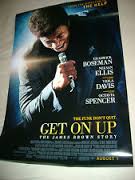
GET ON UP
US, 2014, 139 minutes, Colour.
Chadwick Boseman, Nelsan Ellis, Dan Ackroyd, Viola Davis, Lenny James, Craig Robinson, Octavia Spencer, Tika Sumpter, Aunjanue Ellis.
Directed by Tate Taylor.
Get on Up is a movie portrait of the celebrated soul-singer, James Brown. He is played with great energy by Chadwick Boseman (who had the opportunity to portray another African- American icon on screen, baseball player of the 1940s, Jackie Robinson, in the film, 42).
This is a film for those interested in the popular music scene of the 20th century, especially in the United States and its influence beyond. James Brown was born in 1932 and died in 2006, his career spanning the second half of the 20th century.
Get on Up opens with a number of sequences over the time of Brown’s life, a bizarre episode at a consultant’s meeting in 1988 (later taken up and developed, a significant moment in Brown’s life), an awkward interview with a less-than-savvy white interviewer, as well as his going to Vietnam to perform for the troops in 1968. Then it is back to the 1930s and scenes from Brown’s childhood.
Some audiences have found this difficult, the moving frequently from one time period to another, with captions providing information about dates but with references to Brown’s song’s and their success. But the juxtaposition of episodes is a way of providing explanation of behaviour over the decades. There is also a difficulty for some audiences in trying to pick up all the dialogue of the film, especially that of Brown himself, with his Georgia accent and his rather harsh and screeching voice tone.
However, audiences will be able to put together, even though it is given piecemeal, the narrative of Brown’s life and career. He had a particularly harsh childhood, living with his mother (Viola Davis in another interesting and different performance), his father away for work but, on his return, a violent man who drives away his wife and will not let his son go with her. James learns something of music from his father, but eventually he is sent into town to live with his Aunt Honey (Octavia Spencer). One of the influences in this part of his life is going to church, hearing the music, experiencing the rhythms, movement and dancing, and being encouraged to develop his music. There is another powerful sequence where eight young boys are blindfolded, one hand behind their back, commanded to fight to the end – while the affluent whites watch from their balconies and a formally-dressed band plays.
By the 1950s, James is part of a band, taking every opportunity (even from Little Richard having a break during performance) to perform for the public. Brown is not a blushing violet, taking every opportunity to promote his band and himself, and had a talent for the business side. This leads to an audition, the making of an acetate record, being introduced to the King Recording company, being taken on by one of their agents, Pop (Dan Aykroyd), who persuades the boss who doesn’t understand Brown’s music, expecting verses and chorus for the definition of a song. The main crisis, as with any outstanding individual performer, is a company wanting him to perform without his backup and band. His closest friend, Bobby Byrd (Nelsan Ellis) does stay with him until it finally becomes impossible.
Brown’s personal life is rather in the background, marriage and children, a roving eye, divorce, a second marriage, more children.
The important thing, of course, is the music, the range of songs and lyrics, the particular style, not only singing but agility in dance rhythms, characteristic of him himself and his backup singers. The screenplay traces the years, the decades, highlighting a number of songs and their contribution to Brown and his success, his concerts, his growing audiences, his influence on younger musicians and singers. There is a scene where he performs in Paris in 1981 – which is also the time when Bobby Bird has had enough and leaves him, commenting that he has always been alone.
The concert in Boston, and whether it should go on or not, after the death of Martin Luther King, shows Brown’s intelligence and shrewdness, quite an affecting sequence.
Audiences may remember that Brown spent some time in prison – and that is the situation for the 1988 encounter with the people at a meeting, Brown firing a rifle shot, driving off and being chased by police, and eventually finishing up in jail.
The film ends more peacefully with a reconciliation with Bobby Bird and his wife and information that Brown kept performing until his death, into his 70s.
There have been a number of dramatic films about African- American musicians, including Clint Eastwood’s 1988 Bird, about Charlie Parker, and Taylor Hackford’s 2004 Ray, about Ray Charles.
1. For audiences like 20th-century popular? Black? Soul? The response to the music?James Brown, audiences liking him, knowledge about him, interest in him? His being always called Mr Brown? As a person, his life story, his career, the impact on music and performance? In the US, beyond?
2. The title and the tone, James Brown’s words?
3. The structure: opening at the concert in 1993, the Vietnam sequence, the white woman journalist and her interview, the episode in the office, the woman going to the toilet? Seeing James as a child? The titles throughout the film naming the year and the songs? Confusing for audiences? The presentation of the story in piecemeal, providing explanations with the insertion of the different times and indications of Brown’s career?
4. The Georgia backwoods, the town of the 1930s? Moving across the United States: concerts, the venues, recordings, offices, hotels, Brown’s businesses? The death of Martin Luther King and the concert in Boston? The concert in Paris? Brown and his turn in the office, the car chase, the gun, going to prison? The way that the screenplay built up Brown’s character?
5. The musical score, Brown’s songs, over the decades, rehearsals, performances, the rhythms, infectious, audience responses? The origins of Brown’s musical talent, black Americans, the evangelical churches and the music, his personal imprint, singing in clubs, making the record, at Little Richard’s club, the concerts, the cumulative effect? The final song, sung for Bobby Byrd, I Need You and Byrd’s response?
6. Boyhood, his mother chasing him in the woods, the father returning from work, the reaction, the sexual response, his father and his violence, the beatings, his mother leaving, wanting to take James, the father shooting, her going off alone? James of the table with his father’s singing, his father’s violent reaction, James’s determination, going to the town, in the care of Aunt Honey, his work, the club, the atmosphere of a brothel? The contrast with church, the music, his dancing, the pastor and his recognising the gifts? Other flashbacks, lining up of the eight boys, blindfolding them, one hand free, the fights to the winner, James’s number 1? The whites in the mansion watching, the black band playing? The effect on James?
7. As young man, 22 or 23, his friendship with Bobby Bird, the other players, taking Little Richard’s place, Richard’s response, flipping burgers and giving James advice? In the diner, avoiding the law officers, finding that it was a recording scout? Going to the studio, the meeting with Pop? Their singing Please? Head of King Records not understanding it, Pop explaining that it was not the song with verses and chorus but feeling? The boss trying the attempt at the Potato Mash, explaining that he was at good business, and James with music? James and his interest in the business side of things, the discussions with Pop, James and his financial shrewdness? Yet his difficulties with taxes and the consequences, especially paying the members of the band?
8. The band, the members, their characters, plain, together, travelling, the rhythms? The recordings? Meeting at the office, the boss, Pop, James sitting at the table, his stand-alone status? Their leaving?
9. Bobby Byrd, friendship, working with James, staying, knowing his limits, his marriage to Vicky and happiness? The tensions over the years, Brown’s attitudes, patronising? Paris, Bobby Byrd walking out, after imagining that he could be a top-liner? Saying that Brown was always alone? Brown later visiting, the irony of the white company cleaning the pool? The concert of 1993, Bobby and Vicki present, the song dedicated to him? The final credits and the indication that they work together after this?
10. Brown, his marrying, children, in the background, looking at his second wife from the stage? Marriage, the Santa Claus sequence and the man ogling his wife? The return home, his punching her? Her luxury? The children, his pride in his son?
11. The Vietnam concert, in the plane, his bravado, the explosions, the landing with the engine on fire? The officer, dictating how long the concert should go, Brown’s asserting himself?
12. The death of Martin Luther King, the mayor of Boston, Brown wanting the concert to go on, Pop and his negotiations? The motivation, the concert itself, the African- Americans united? The young men getting on the stage, the police pushing them off? Brown stopping this, talking about freedom, unity, calming people down, the men going back into the audience? His talent in making this concert a political success?
13. Pop, the death on the golf course, Brown at his funeral, his grief, continually shovelling the dirt in the coffin?
14. Paris, international success?
15. The gaps in the years? Audiences supplying an interpretation, success, the interview with the white journalist, asking what he ate, handing over the interview to Bobby Byrd?
16. 1988, coming to the office, his enterprises? His performance, firing the gun, people on the floor, asking who went to the toilet, his bizarre interpretation, the fear of the woman? Getting into the car, the police chase, crashing through, his being arrested, in prison?
17. Brown in his 60s, going to visit Bobby Byrd, something of a reconciliation?
18. The information given in the final credits, Brown dying in 2006?
19. The film’s contribution to people understanding how significant an influence Brown was with his music, singing, his performance, dancing steps, the Godfather of Soul?
Published in Movie Reviews
Published in
Movie Reviews
Tagged under
Saturday, 18 September 2021 19:51
Canyons, The
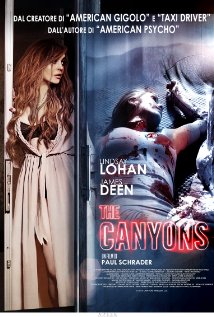
THE CANYONS
US, 2013, 99 minutes, Colour.
Lindsay Lohan, James Deen, Nolan Gerard Funk, Amanda Brooks, Tenille Houston, Gus Van Sant.
Directed by Paul Schrader.
This is not a very good film. Which is a pity, because it is directed by Paul Schrader, writer of some of the most significant films for Martin Scorsese, including, Mean Streets, Taxi Driver, The Last Temptation of Christ. He has also directed a number of significant films in his own right, including, Mishima, Blue Collar. Much better and more significant is Schrader’s 1979 film about a father, George C. Scott searching for his daughter in the ugly world of pornographic films in Hardcore.
The screenplay has been written by Brett Easton Ellis, novelist for American Psycho, Rules of the Game, The Informants.
The subject of The Canyons is not new. It is a look at aspects of Hollywood, the world of independent cinema, the range of characters who get involved in this aspect of film-making. But, they are not particularly interesting characters. Nor are most of them sympathetic, characters that audiences would become involved with.
The budget of the film was $250,000, a very low budget and, at times, this is obvious. Combined with the B-budget is a kind of B-movie mentality.
The film focuses on a young man, Christian, with touches of the psychopathic, who is involved in financing a small budget film in Latin America. His glamorous partner, Tara, who seems not to have anything better to do, also becomes involved in the production. However, when she encounters the man chosen for the leading role, it emerges that she had been in a relationship with him in the past and resumes the relationship unbeknownst to Christian. The young man himself is also in a relationship with an earnest young woman, probably the most sympathetic character all-round, who is involved in the production and is excited to have her boyfriend as the star.
This means that there are a lot of scenes between these four central characters, seeming to get on with each other at times, hiding the tensions that lie underneath.
There are also the sexual proclivities of some of the central characters. Christian is not above having relationships with other women, urging men-on-men relationships when it suits him to manipulate people, also participating in a foursome. When he finds out about Tara, he sets out to destroy her boyfriend, trapping him into a sexual encounter with one of his employees, an art director, as well as getting a computer expert to empty his bank account, leaving him without anything, especially when the truth of the relationship emerges for his girlfriend. He is portrayed by Nolan Gerard Funk who has appeared in the number of movies (The House at the End of the Street) and television episodes but who does not communicate here that he has much acting talent.
Lindsay Lohan is Tara, looking more than a touch jaded and older than her real age, after the episodes that have dogged her in real life. Christian is played by James Deen, a well-known Los Angeles pornography star, who does show some acting ability, especially in the tantrums and final madness-driven violence of his character. Of movie interest is the fact that well-known director, Gus Van Sant, has a cameo role as Christian’s therapist.
Quite a lot of talk. quite some sex and nudity. Some drugtaking. And, as with Brett Easton Ellis, a certain amount of boredom in presenting the lives of characters who, to audiences who really do have a life, are fairly boring.
Published in Movie Reviews
Published in
Movie Reviews
Tagged under
Saturday, 18 September 2021 19:51
Omagh
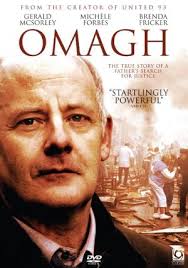
OMAGH
UK, 2004, 106 minutes, Colour.
Gerard Mc Sorley, Michele Forbes, Brenda Fricker.
Directed by Pete Travis.
Omagh is a powerful film made for television by director Pete Travis, (Vantage Point, Endgame, Dredd, Legacy). It was co-written by Paul Greengrass who two years earlier had made the film about Ireland and The Troubles, Bloody Sunday. It features Irish actor, Gerard Mc Sorley, who gives a most moving performance.
A bomb was exploded in the centre of Omagh in Northern island in 1998, killing a number of people and wounding others as well as causing grief to the families of the dead. This film is based on information and events.
The prologue shows the bombers setting up the bomb, bringing it to the town. There was a warning 30 minutes in advance but, for whatever reason, the exact location of the bomb was misinterpreted and there was a greater loss of life.
Part of the impact of the film, especially with hand-held camera, is the explosion itself, the aftermath, the dead and wounded, the hospitals, people searching for loved ones amongst the dead and injured. And the film also focuses on one family, that of Michael Gallagher, whose son Aidan was killed. The film shows his search but also shows his response, his going to meetings, his speech urging everyone to be involved in discovering the truth. He was also interviewed the papers and for the British BBC television show, Panorama. He also interviewed an informer, Fulton, whose testimony was later discredited. While he persevered with his campaign, it took a great toll emotionally on his wife and on his daughter who challenged him to be caring for them more than for the others for whom he was campaigning.
There is a strong ending with Brenda Fricker as the ombudsman delivering her verdict on investigations into the situation, the bombers, and especially the police and their responsibilities.
The film is informative as well as very moving.
1. The true story of the bombing in Omagh? The facts, the memories? The impact in Ireland in 1998? The IRA, the Real IRA, the background of decades of The Troubles?
2. The locations, the countryside outside the town, the town itself, the Main Street, homes, hospitals? An ordinary day? The day starting up, the shops, the people, the radio broadcasts? The increasingly busy day?
3. The hand-held camera work, the sense of immediacy?
4. The problem, the men preparing the bomb, carrying it in the car? The intercutting with the cars, the men, setting it up?
5. The focus on the Gallagher family, their day, starting, breakfast, talking, going out, Michael and his son in the garage? Aidan and his friend going into town?
6. The phone call warning of the explosion, 30 minutes, the woman listening, slow, checking everything, writing it down, giving it to the police, the reaction of the police, moving people away from the alleged site? The explosion, the shock, the aftermath, the injuries?
7. The Gallagher family, the aftermath, Michael and his search? At the site, going to the hospital, trying to find news of Aidan? Identifying his features? Back home and the rest of the family, the mother, the sister, the grief?
8. The priest and the Anglican minister, both helping, friendly, comforting? The priest at the funeral? The press, the aftermath, the guests, Michael and his wife alone?
9. The political situation, the Good Friday agreement, the Real IRA and their rebellions, Tony Blair and his words? Interventions and lack of intervention?
10. The families gathering together, the meeting, the feeling, issues of compensation, demanding arrests, argument amongst themselves? The outspoken
man attacking the British government?
11. Michael, his speech, his ecumenical outlook, everybody helping? The phone and the self-help? The police, the demands that evidence? The demonstrations? The phone calls? Panorama and the newspaper interviews? The effect on Michael, his wife and her growing exasperation?
12. Gerry Adams, his background, the IRA, his coming to talk with the grieving people, his attitudes, the politics?
13. The BBC, the identities, the meetings, the possible names?
14. Michael, his going to see Fulton, Fulton and the intensity of his witness, offering to name names – and the exposure as self-centred and fake?
15. The authorities, wanting information?
16. The report of the ombudsman, her review of the facts, the presentation, her sympathy for the victims, for the families, her assessment of the police, the lack of following leads, losing evidence, lack of accountability?
17. The comments on the politicians, the Englishman and the death of his son, the letters to Tony Blair, the bland answers?
18. Michael Gallagher, the personal effect, his interventions, his speeches, the contact with the media, the exhaustion, following leads, return home, working
in the garage, life going on?
19. The information at the end, the identification of the bombers, legal complexities, their not been brought to justice?
Published in Movie Reviews
Published in
Movie Reviews
Tagged under
Saturday, 18 September 2021 19:51
High Fidelity
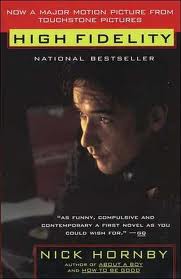
HIGH FIDELITY
US, 1999, 113 minutes, Colour.
John Cusack, Iben Hjejle, Todd Louiso, Jack Black, Lisa Bonet, Catherine Zeta- Jones, Joan Cusack, Tim Robbins, Lili Taylor.
Directed by Stephen Frears.
High Fidelity is based on a novel by Britain’s Nick Hornby, author of About A Boy, Fever Pitch. It has been transferred to Chicago with an American flavour. However, it has been directed by British director, Stephen Frears, a prolific director for over 40 years, including Dangerous Liaisons, The Grifters, Philomena…
The setting is a music shop with several enthusiastic men, two of whom are quite nerdish, trying to sell records in line with their own taste. Part of the game is to create lists of their favourite records and musicians. But, Rob, the owner of the shop, indulging in the lists, also has a list of his most important relational break-ups. This provides the opportunity for flashbacks for these relationships as well as his attempt to contact all the women again to discover why they left him. The most permanent relationship is his present one with Laura, Iben Hjejle, but which is also in danger as she packs up and leaves him. Rob’s mother is on her side. So, also is her friend Liz who tries to talk sense into Rob. Some of the other women are portrayed by Catherine Zeta -Jones and Lili Taylor.
Also in the forefront is Jack Black, giving an indication of the type of rough comic performances he would give over the coming years. Todd Louiso is the well-informed but awkward Dick.
Audiences who are of Rob’s age in the film will probably enjoy it, make comparisons with their own lives and relationships – and even their tastes in music.
1. A popular film? Fans of popular music? The novel by Nick Hornby, British, transferred to the United States?
2. The title, music and its sound, themes?
3. Chicago, the city, apartments, clubs, the music shop?
4. The music, audience taste, the variety, trends and styles, lyrics, lists and interests? The comic responses?
5. Rob, John Cusack’s performance, talking straight to camera? His age, experience, his relationship with Laura, her leaving? His range of lists? Especially about women and relationships? About music? His break-ups, going back into the past, at school, at college, Charlie, the two years, Sarah, the singer Marie? The encounters, the times, their leaving him, the effect on him?
6. His decision to re-visit, the girls, their mothers, and the truth, his reactions, Charlie and her flightiness, Sarah and her intensity and moving out, not wanting to see him again? The time with Marie?
7. The interactions with Laura, his mother’s comments, Liz and her friendship with Laura? Confronting Rob? Angers, Laura returning to take things, the talk, the death of her father, sadness? Making up, her needs, his needs? The credibility?
8. The lists of the music, Barry and Dick, their personalities, the Jack Black cheeky style, Dick and his being a nerd, but well informed? Barry and his aggression? Dealing with customers, sending them out if they disagreed with them, the father wanting to give a record to his daughter?
9. The customers, the reactions, insults, not selling some of the discs – but keeping them for later customers?
10. Laura and Ray, his character, neighbour, with Laura, going to the shop, Rob imagining dealing with him violently, the reality and his leaving?
11. The opportunity for the youngsters, their song, age, their look, their music, interactions, the contrast, producing the song, playing it?
12. Barry, his success with the music, unexpected?
13. Characters of the 1990s, music, old-time music stores? Relationships? Men and women? Success and failures?
Published in Movie Reviews
Published in
Movie Reviews
Tagged under
Saturday, 18 September 2021 19:51
Dreamcatcher
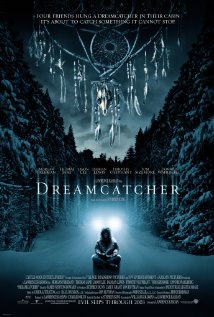
DREAMCATCHER
US, 2003, 134 minutes, Cover.Colour.
Morgan Freeman, Thomas Jane, Jason Lee, Damian Lewis, Timothy Olyphant, Tom Sizemore, Donnie Wahlberg.
Directed by Lawrence Kasdan.
Dreamcatcher is an ambitious screen interpretation of Stephen King’s novel. It has a big budget, a reputable cast, alien creatures, action and special effects. It was directed by Lawrence Kasdan, co-written by him with celebrated screenwriter, William Goldman.
The background of the story has some “mystical” aspects, with flashbacks to the boyhood of the four central characters, reminding audiences of Stand by Me. They save an impaired young boy from being bullied, and he seems to transmit powers to them, knowledge of what is going on, past and future.
In the present, they are four adult men who team up for a weekend in the country. Then the film turns into an alien invasion and penetration film, with Morgan Freeman in charge of operations. The four men become more and more involved, leading to some deaths and some heroic stances to stop the Boston water supply from being infiltrated by the aliens.
The whole thing is a rather heady mixture, somewhat surprising to see those involved in an alien attack film.
The performances are mixed, some vigorous, some rather wooden (like that of Thomas Jane). The film is one for Stephen King fans and those interested in films about aliens.
1. An adaptation of Stephen King’s novel? King’s themes, characters, horror, aliens? The high-budget treatment? Cast?
2. The title, the initial drawing, the emblem hanging from the roof, Duddits as a dreamcatcher, the three boys and Duddits’s effect on them? Their power to see and know things? Dream catching?
3. The locations, the past, the summer, the atmospheric boyhood, troubles, happiness, the mystery of Duddits and the lost girl? The contrast with the present, winter, the scenes in Boston of each of the characters and their work? The village, the house, the forests and the snow? The occupied town? The military? Helicopters and gunfire? The interiors, the house, the toilet, Jonesy’s imaginary repository, the military officers, the hospital? The musical score?
4. The introduction to each of the characters, Henry and his psychology, his fat client, telling him information about his mother’s death, humiliating him, his regrets, putting the gun to his head, the phone call? Jonesy, his work, friendship, the weekend, seeing Duddits across the street, walking into the traffic, his being hit, hospital, his being alive again? His psychological state? Pete, his life, work, drinking? Beaver, and the organising of the weekend? Their arrival, settling in, the house?
5. The insertion of the flashbacks, the boys, their age, confronting the bullies, rescuing Duddits, the effect of Duddits on them?
6. The two going to the store, the ride back in the snow, swerving on the alternate path, seeing the man in the snow? The woman in the snow? Thinking her dead, her coming alive, her words? Henry walking back to the house, Pete remaining with the woman?
7. Jonesy and Beaver in the house, settling in, finding the man, his bewildered state, taking him into the house, flatulence, giving him the bed to rest in, finding the toilet, the emergence of the aliens, Beaver sitting on the toilet, the struggle, his death? Jonesy, his fears, searching for the tape, returning and finding the bodies, the body exploding, the fumes, Jonesy absorbing them, the alien inside his body, his real self in the repository, trying to get rid of the documents? His being outside, seeing his possessed self on the sleigh, the two talking to themselves, changing voices? Finding Pete? Trying to rescue him? His death?
8. Pete, in the snow, with the woman, urination, the alien emerging, clinging to him, his death?
9. The transition to the town, Curtis and his command, Morgan Freeman’s presence, his explanations to Owen, Owen’s loyalty? The possessed, the destruction of the creatures in the area? Helicopters and fire? Owen doubting Curtis? The missions? The dangers for the helicopters? The return? The general arriving and confronting Curtis, Curtis’ talk about retiring, 25 years combating aliens? His mental state?
10. Henry coming to the town, his mental powers, being interned, talking with Owen, persuading him of the truth? Owen in the car, the gun, the device for location detection? Talking? Wanting to find Jonesy? Jonesy and his going to the dam, their meeting with Duddits?
11. Duddits, the past, been bullied by the boys, the group rescuing him, the powers, finding the girl in the well> Their admiration for Duddits? His house, his mother looking after him, letting go, the medication? In the car?
12. Arriving at the dam, Jonesy and his split personality, Henry trying to discern which character it was? Duddits, knowing everything from the beginning, the alien as Mr Grey, his transformation into an alien, the struggle with Mr Grey, destruction, Jonesy’s treading on the alien before it got into the water supply?
13. The world saved? How persuasive a horror film, a monster film, aliens film, a military? An interpretation of Stephen King?
Published in Movie Reviews
Published in
Movie Reviews
Tagged under
Saturday, 18 September 2021 19:51
Four Lions
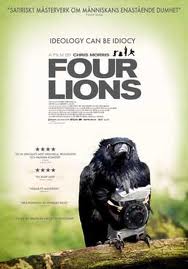
FOUR LIONS
UK, 2010, 97 minutes, Colour.
Riz Ahmed, Nigel Lindsay, Arsher Ali, Kayvan Novak, Craig Parkinson, Benedict Cumberbatch, Darren Boyd.
Directed by Chris Morris.
Satire and parody. How far can you go?
Some cultures are good at satire and enjoy it. The British comedy tradition is in that vein. Americans are less prone as a whole to appreciate irony. Recent events have made satirists and cartoonists very wary about Islam. With Christianity it seems no holds barred.
Those may be some of the thoughts before seeing Four Lions if you have heard that it is a black comedy about suicide bombers and was made by Chris Morris who has had a strong, if chequered, career as a television satirist. Can you make a film on this topic these days – well, he has made it, so the question is should he have made it. Chaplin mocked Hitler and Mussolini in 1940 in The Great Dictator. Perhaps the lines were so easily drawn then, that it didn't matter if the Germans or Italians didn't like it. Now innocent victims of suicide bombers are in our midst and their relatives and friends grieve. Satire, mockery? The quickest answer is that if this does not sound like your sense of humour, then simply don't go. If you feel that one way of coping with the terrible consequences of fanatical beliefs is to show the ridiculous side of such behaviour and the less-than-heroism and even stupidity of those who believe that they are martyrs with instant entree into heaven, then here you are.
Four Lions is often cleverly written and, at times, makes for some laugh out loud comedy. Riz Ahmed (Road to Guantanamo) has decided that the best thing to do, given the terrible state of the world, is to commit an atrocity and blow bystanders up with himself. Two of his friends (and now disciples) are, to put it kindly, very slow-witted. This offers an occasion for mocking the taping of the video messages, for instance, let alone the inefficiency of the attempts by amateurs like these. The other member of the team is Barry, Anglo- Saxon, but a convert to terrorist Islam where he has made a place for himself that he could not do in real life. He is the critic and the contradictor.
They go to Pakistan for some training but are fairly hopeless and get sent home.
They are also essentially British and they fall back on different taken-for-granted little details of British life and customs, TV and music, food, ordinary jobs in the workplace, which shows the mixed motives that have not been sorted out.
Eventually, they set on a plan to sabotage the London Marathon. Most things that could go wrong do go wrong but in a deadly way – which is a means of questioning the religious and/or fanatical beliefs that would persuade men and women to offer themselves as suicide bombers. (For a very serious look at two bombers from Palestine going into Israel, Paradise Now is well worth seeing – as well as the Israeli films, Omar, Bethlehem and Rock the Casbah.)
1. A 21st-century story? Islam? The UK? Pakistan? The events of the 21st century, terrorism, Jihad mentality, suicide bombers, recruits and training?
2. The tone, satire, parody? Serious intent by satire?
3. The heightened characters, situations? How real? Foolish, destructive?
4. Islam and humour – very limited? Western comedy mocking the US, but not Jihad, Taliban?
5. The UK city, the North, jobs, security guard, homes and families? London, the Marathon, on the streets, the running, the shops, the kebab diner, authentic?
6. Omar as the leader, his life at home, his wife and family, his work, his friend, getting him to cover for his visit to Pakistan? Waz and his friendship? The encounter with Barry, his leadership, the car, Barry’s wanting to go to Pakistan? Omar and Waz going? The reception, hostile, domineering, their cases and their stuff have been taken, the warnings? Waz taking the photos of himself with the gun? The weapons? The drone, Omar and his firing the missile, back to front? Killing his own side? Their hurrying back to the UK?
7. The support of his wife and her understanding?
8. Barry, the convert, being on the panel, the MP and the other members, the speeches about Islam? His haranguing tone? The young man in the audience, the warning about the bomb, the false explosion, the aftermath, his being in the street, Barry offering him a lift? Recruited? The other members at the mosque? The indoctrination?
9. Barry, his ideology, Islamic dress, still being very British, his swearing, his whole sense of culture? Adopting Islam, as a veneer?
10. Omar, his sensibilities? Waz being confused? the members of the group, the practice, going over the fence, the exploding sheep? The dance and the weapons?
11. Foolishness, stupidity, the plan, the drive to London, the odd costumes, Omar seeing his co-worker? The running of the Marathon?
12. The explosions, the man trying to help and being killed, Barry and the wall? Waz and his being in the kebab shop, the hostages, the phone calls, confused, Omar trying to get him straight? His death?
13. Omar, decisions, the phone calls to Was? Omar, the chase, his co-worker? His going into the shop, his death?
14. The negotiator, his style, interrogations, attempt to talk Waz down? The snipers, their shooting – and declaring that because someone was shot that meant it was that real target?
15. The aftermath?
16. The influence of this film in the UK, holding the terrorists up to ridicule?
Published in Movie Reviews
Published in
Movie Reviews
Tagged under
Saturday, 18 September 2021 19:51
Burton and Taylor
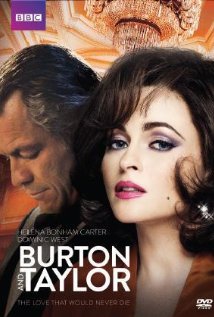
BURTON AND TAYLOR
UK, 2013, 90 minutes, Colour.
Dominic West, Helena Bonham Carter.
Directed by Richard Laxton.
Burton and Taylor is a British telemovie, relying on memories of those who were interested in the couple, the headlines, the scandals, their films. Whether it is a good introduction to audiences not familiar with the couple is a moot question.
The film takes place in 1983 when Elizabeth Taylor had the idea that she should perform on Broadway, in Noel Coward’s Private Lives, and star with Richard Burton. She had not even read the play. Burton agreed, at this stage of his life partnered with the British Suzy Hunt whom he marries during the run of the play in a secret ceremony in Las Vegas.
Which indicates that Elizabeth Taylor really loved Burton and he her, but it was impossible for them to live together despite the two marriage attempts.
Dominic West has the gravity of Burton, impersonating him well, bringing to life the talented actor who, in some ways, had squandered his talent on mediocre films and plays but was still regarded as a superior actor. The performance also indicates Burton’s love for Elizabeth Taylor, aspects of their life together, their extravagance, the jewellery, the drinking, the squabbles – but their inability to live with any compatibility together. Helena Bonham Carter looks something like Elizabeth Taylor, imitates her manner, emphasising some of the obtuseness and the slatternly Whose Afraid of Virginia Woolf slightly style of Taylor as well as her ability to act.
While Taylor is obsessed with Burton, she is also obsessed with her power in the entertainment industry, controlling the play, the director, the cast, Burton himself, sometimes drinking, playing to the audience, performing on stage and off.
Something of an opportunity to learn something of Burton and Taylor.
1. Audience interest in Richard Burton and Elizabeth Taylor? Celebrities of the past? Their marriages? Love and clashes? Their films together?
2. The title, the impersonations and performances by Dominic West and Helena Bonham Carter?
3. 20 years after the headlines? From the 60s to the 80s? Their marriages? Life and style? Affluence, the diamonds? Alcoholism? The episode a short
time before Richard Burton’s death, Elizabeth Taylor going to the Betty Ford Foundation?
4. The episode, the performance and a Noel Coward play, on Broadway? For Burton? The challenge for Elizabeth Taylor? The popularity with audiences? The critics being negative? The experience for both?
5. The opening press conference, Elizabeth Taylor and her snide remarks, the clash, the show? Burton uncomfortable?
6. Elizabeth Taylor’s idea, and not reading the play, the reasons? Her wanting to be with Richard Burton, a continuing love him, yet her love for power over him, performing on and off the stage?
7. Richard Burton, his age, his relationship with Susan Hunt, his career, drinking, his reputation, his skill and acting, the acclaim, serious-minded, yet the relationship with Elizabeth Taylor?
8. Elizabeth Taylor at 50, her reputation, career, being in film and on-stage immersed in her character, Burton’s example of the scene from Cleopatra?
9. The rehearsals, her arriving late, the performance, the director, his reputation, the cast, the response to Taylor? Not having read the play, her awkwardness, finding the place? Burton and his disgust with her? The progress, her being tiresome, the test for her?
10. The relationship, Richard Burton and his partner, going to Las Vegas, the wedding, not telling the press, not telling Elizabeth Taylor? The peacefulness with his new wife? Yet the love and fascination for Elizabeth, meetings, drinks, talking, staying the night, reminiscences? Restaurant outings, the clashes? Her exercise of power, yet her obsession with him? The impossibility for them to be together?
11. The performances, the costumes, the assistant and the clash with Burton? The critics? Elizabeth drinking, on an off with her performances, playing to the audience, the applause? Her moods, being sick, the box office going down, her return?
12. Noel Coward, the lines, the wit, the references to Sybil – and Burton’s first wife as Sybil – style, mannered?
13. An experience of Burton and Taylor for the audience, deeper than the gossip items? The pathos of Burton’s death soon after?
Published in Movie Reviews
Published in
Movie Reviews
Tagged under